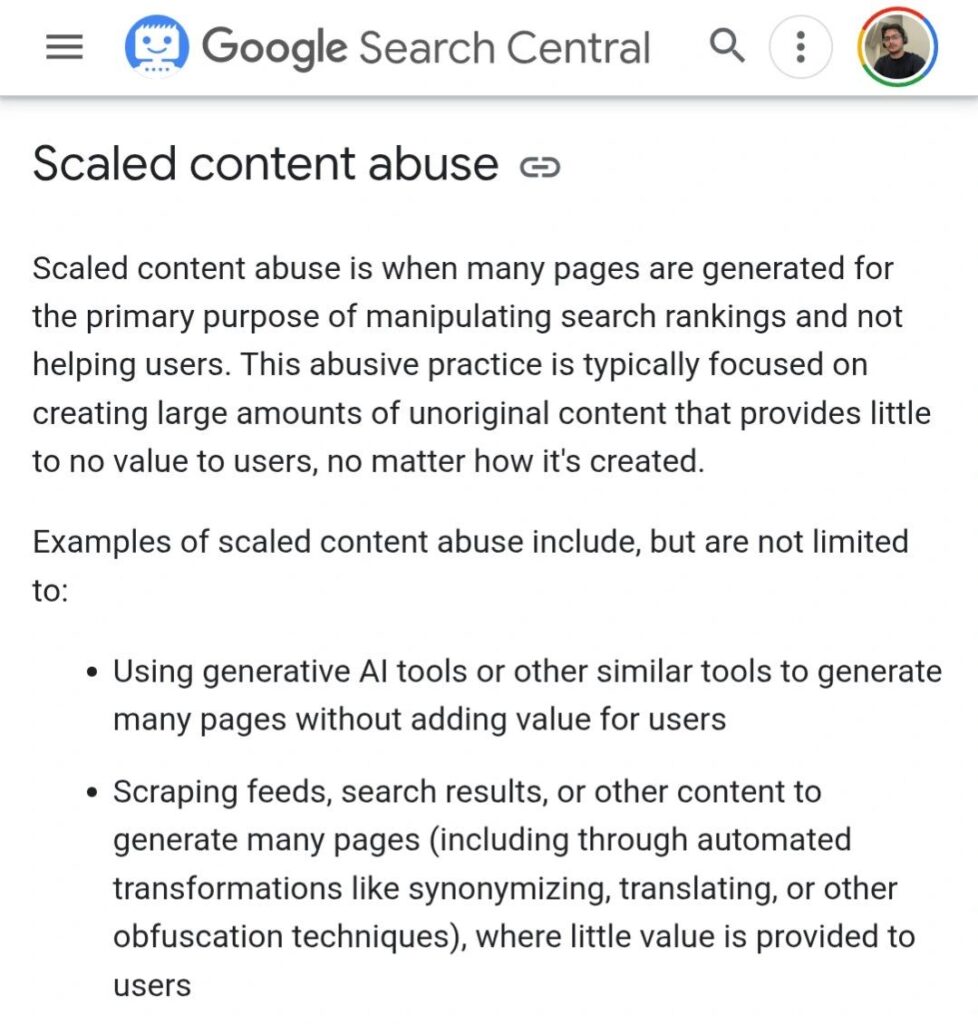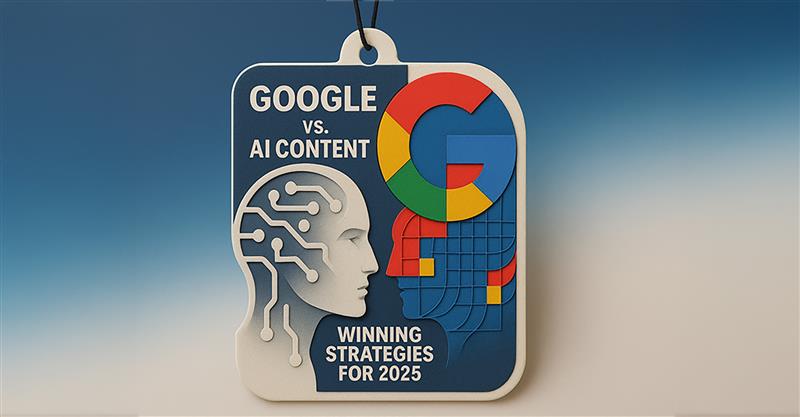Key Points
- ➽ It seems likely that Google is cracking down on excessive AI-generated content, affecting site rankings.
- ➽ Research suggests humanizing AI content and ensuring quality can help avoid penalties.
- ➽ The evidence leans toward disclosing AI use and moderating content to prevent issues.
- ➽ There’s controversy around what constitutes “abuse,” with some sites feeling unfairly penalized.
Understanding the Issue
Google has recently started issuing manual actions for sites using large amounts of AI-generated content at scale, especially if it’s low-value or unoriginal. This can lead to sudden ranking drops, as seen in many sites across the UK, USA, and EU, with notifications in Search Consoles citing “scaled content abuse.” As @NicolasLaruelle explained on X on June 3, 2025, “Scaled content abuse is when many pages are generated for the primary purpose of manipulating search rankings and not helping users. This abusive practice is typically focused on creating large amounts of unoriginal content that provides little to no value” . This definition highlights Google’s focus on content quality, sparking debates among site owners who feel their use of AI tools is unfairly targeted.

Solutions to Avoid Penalties
To avoid such penalties, focus on humanizing your AI-generated content and ensuring it adds value. Use advanced AI models like GPT-4o, replace em dashes with standard dashes, and avoid buzzwords listed in resources like this Reddit comment. Add multimedia, proofread manually, and set custom prompts for natural writing, such as, “Write like a human, professional but conversational, avoiding buzzwords like ‘streamlined’” (credit to Justin Fineberg). @Xpen6th emphasized on X on June 5, 2025, “AI-generated content requires human oversight for accuracy, brand alignment, and industry-specific nuances. While Google accepts AI content that provides genuine value, it must be fact-checked and edited” . Additionally, disclose AI use, moderate user-generated content, and publish gradually to avoid spam triggers. Regularly check Google Search Console for issues and address them promptly.
Additional Tips
Ensure your content is original, well-researched, and aligns with Google’s E-E-A-T principles (Expertise, Experience, Authoritativeness, Trustworthiness). Use AI writing detectors like GPTZero, ZeroGPT, or Grammarly’s AI Detector to test for AI flags. Avoid black hat SEO practices like buying links, as these can exacerbate penalties.
Comprehensive Analysis and Detailed Insights
This report provides a detailed solution to avoid Google manual actions for excessive use of AI-generated content, based on observations and best practices as of 2:34 PM IST on Tuesday, June 10, 2025. It addresses the crackdown initiated around June 3, 2025, and its implications for website owners and content creators, drawing from expert insights, official guidelines, and real-time discussions.
Background
Google has begun issuing manual actions for what it terms “scaled content abuse,” targeting websites that excessively use AI-generated content at scale. This aligns with the company’s ongoing efforts to ensure search results are helpful and high-quality, as outlined in Google Search Central: Using Generative AI Content. The crackdown, first noticed last week, has led to significant ranking drops for many sites, particularly those with established authority that were leveraging AI content to rank well for numerous queries. As @JohnLanoVoice noted on X on June 9, 2025, “Google just recently updated its policy on AI-generated content wrt to search rankings. If the most or majority of content is AI, pages will be hit with a big penalty” . This policy update underscores Google’s commitment to combating low-value content, echoing past efforts against practices like keyword stuffing and content farms but now focusing on AI-driven automation.
Impact on Websites
Sites affected by these manual actions are seeing complete visibility drops from Google search results, particularly in the UK, USA, and EU. These sites receive notifications in their Google Search Consoles stating, “It appears that the pages of this site use aggressive spam techniques, such as large-scale content abuse.“ Some site owners believe that ranking well protects their AI-generated content from penalties, but as @glenngabe clarified on X on June 5, 2025, “But our AI generated content is ranking well -> yes that is the reason Google will issue a Scaled Content Abuse manual action for your site!” . This highlights that Google evaluates overall site quality, not just individual page performance, fueling controversy over what constitutes “abuse.”
Detailed Solutions to Avoid Penalties
To mitigate the risk of manual actions, website owners and content creators should implement the following strategies:
Understand Google’s Guidelines on AI-Generated Content:
Familiarize yourself with Google’s policies, which state that using AI to generate many pages without value may violate its spam policy on scaled content abuse source. The 2025 Google Quality Raters Update emphasizes that AI content can receive a “Lowest” rating if it lacks originality or value, reinforcing the need for human oversight.
Humanize AI-Generated Content:
- ◾ Use advanced AI models like GPT-4o for human-like output.
- ◾ Replace em dashes (—) with standard dashes ( – ) to avoid AI detection.
- ◾ Minimize buzzwords and emojis; refer to lists like this Reddit comment.
- ◾ Add multimedia elements like images or videos, ensuring they are not AI-generated.
- ◾ Manually proofread to fix errors, hallucinations, and wordy sentences, using AI for initial edits but ensuring human oversight.
- ◾ Set custom prompts for natural writing, e.g., “Write like a human. Keep it professional but conversational. Don’t use em dashes or buzzwords like ‘streamlined.’ Be clear, direct, and natural.”
Ensure Content Quality and Originality:
- ◾ Create content that provides unique insights, is well-researched, and aligns with E-E-A-T principles.
- ◾ Avoid publishing large volumes of AI-generated content quickly to prevent spam triggers. Adopt a gradual growth strategy, such as 10 pages this month, 20 next, and 40 the following month.
Moderate User-Generated Content:
- ◾ Implement strict moderation for user-generated content (e.g., forums, comments) using tools like Google’s site search operator (e.g., site:https://yourwebsite.com spamkeyword) to identify and remove spam.
- ◾ Approve all user-generated content before publishing to avoid spammy links.
Use AI Writing Detectors for Testing:
◾ Test content with tools like GPTZero, ZeroGPT, and Grammarly’s AI Detector to ensure it doesn’t flag as AI-generated.
Disclosure of AI Use:
◾ Disclose AI use with metadata or statements like, “This content was created with AI assistance but reviewed and edited by humans,” as recommended by Google.
Monitor Your Site for Manual Actions:
◾ Regularly check Google Search Console for any manual actions or notifications. If a manual action is issued, address the issues promptly by removing or noindexing problematic content and requesting a review only after making necessary changes.
Avoid Black Hat SEO Practices:
- ◾ Do not engage in practices like cloaking, sneaky redirects, or buying links, as these can lead to manual actions.
- ◾ Focus on ethical SEO practices, such as earning natural backlinks and creating high-quality, user-focused content.
Control Content Velocity:
Avoid sudden spikes in content publication, as this can trigger Google’s spam filters, which are designed to detect patterns of low-quality, mass-produced content, including AI-generated material. Instead, adopt a gradual growth strategy to mimic natural content development and reduce the risk of being flagged as spam. For example, consider publishing 10 pages this month, 20 the next, and 40 the following month, allowing time for each piece to gain traction through user engagement, backlinks, and search traffic. As @tjmakingof noted on X on June 9, 2025, “Did you know, Google can penalize you for suddenly posting blog articles at scale/too fast? That’s why it’s important to space it all out!”. This approach not only helps avoid penalties but also aligns with Google’s emphasis on quality over quantity, ensuring your content appears authentic and user-focused. Additionally, spacing out publications allows for thorough human oversight, enabling you to refine AI-generated drafts into polished, value-driven pieces that meet E-E-A-T standards.
Stay Updated on SEO Best Practices:
Keep an eye on the latest SEO trends and Google updates. For example, Google’s 2025 Quality Raters Update, as discussed in, emphasizes the importance of E-E-A-T in content creation.
Historical Context and Future Implications
This crackdown is not new in spirit but reflects Google’s ongoing battle against low-quality content. It parallels issues from 2005, such as keyword stuffing, article spinning, and content farms, now executed with more sophisticated automated tools. The scale and ease of AI content generation have necessitated this response, highlighting the evolution of SEO practices. The future of content marketing is human-centered, focusing on quality, originality, and user experience. AI should be an assistant, not the master, aligning with Google’s 2023 blog post on AI content at (/search/blog/2023/02/google-search-and-ai-content). Website owners should monitor ongoing developments, as Google may issue more manual actions this week, with updates potentially shared on platforms like LinkedIn.
Detailed Breakdown in Tables
To organize the key findings, here are two tables summarizing the impact and recommendations:
| Impact on Websites | Details |
| Ranking Drops | Sudden and significant, especially for high-authority sites using AI content |
| Manual Action Notifications | Messages in Search Console citing “scaled content abuse” |
| Visibility | Complete removal from search results until addressed |
| Geographic Scope | Notable in UK, USA, EU, based on tracking datasets |
| Recommendations for Content Creators | Details |
| Use Advanced AI Models | Prefer GPT-4o for human-like output |
| Replace Em Dashes | Use standard dashes ( – ) instead of em dashes (—) |
| Remove Buzzwords/Emojis | Use prompts to minimize, reference Reddit list |
| Add Multimedia | Include images/videos, avoid AI-generated media |
| Manual Proofreading | Check for errors, hallucinations; use AI for initial edits |
| Custom Prompts | Set instructions for natural, conversational writing |
| Use AI Detectors | Test with GPTZero, ZeroGPT, Grammarly |
| Disclosure | Label AI use in metadata or statements |
| Moderate Content | Approve user-generated content, remove spam |
| Gradual Publishing | Avoid spikes, publish content slowly |
Conclusion
Google’s crackdown on AI-generated content, initiated around June 3, 2025, marks a pivotal shift toward prioritizing quality over quantity. Website owners and content creators must adapt by emphasizing human oversight, originality, and value to comply with Google’s evolving policies. By implementing the strategies outlined above – such as humanizing AI content, controlling publication velocity, and aligning with E-E-A-T principles – you can minimize the risk of penalties while maintaining a high-quality, user-focused website. As @gaganghotra_ suggested on X on June 9, 2025, “I think if Google do a wave of Scaled Content Abuse manual actions for excessive use of AI generated content that’s something which will put an end to this trend” , indicating that further actions may loom, making proactive measures critical.
Struggling to navigate these changes? Our SEO and content marketing services at Mindbees specialize in crafting original, human-edited content that avoids AI detection and scales safely without triggering Google’s content abuse penalties. Contact us at Mindbees SEO Services to elevate your content strategy and ensure long-term success in Google’s quality-driven landscape.

